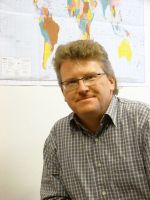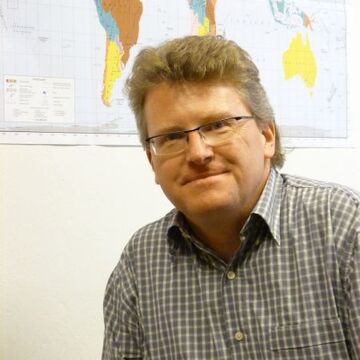The family of diaconal centers is growing
 Interview with Jan Dus about the new Diakonia Center, floods, projects abroad and development aid
Interview with Jan Dus about the new Diakonia Center, floods, projects abroad and development aid
Jan Dus works since September this year at the ECCB Diakonia. Some of his responsibilities are foreign relationships and being the director of the newly founded Center for humanitarian and development aid. Jan Dus, previously pastor of the ECCB parish in Polička and then employee of the Church Office was the guest for this interview.
Honza, what is actually the new Center for humanitarian and development aid?
Within the family of our Diakonia centers, we are the youngest and smallest sibling. We were established January 2011, but have only started to work fall this year. Well, and so far we have not even two full-time positions. I share the work with my colleagues Jana Škubalová and Olga Mutlová.
In which areas of humanitarian aid will the center work?
Our work has two branches: humanitarian aid in the Czech Republic and development / humanitarian aid abroad. It is of advantage that we can build in both cases on previous experiences. Diakonia has helped several times in the Czech Republic during floods (most recently last year in Northern Bohemia) and has received much praise for this. And therefore Olga Mutlová will continue to do this work, domestic humanitarian aid, now officially for us.
We also build on the previous work of Diakonia when it comes to our work abroad. We are developing the help for Ethiopia further where Diakonia supports a project of the local Lutheran Church that cares for orphans whose parents died of AIDS. For this project Diakonia employees have already organized two fundraisers. Another country, with whom we have a previous relationship to build on is Romania. Our Diakonia organized for their local Diakonia training courses for upper and middle management in 2008 and 2009.
Does Diakonia aim to develop humanitarian aid abroad 'big style' and to take its place amongst the like of 'Adra' and 'Menschen in Not / People in Need' when it comes to media presence?
At the beginning we will concentrate more on development aid than on humanitarian actions. At the moment we neither have the staff, nor the resources, to start a media campaign quickly and to intervene lightning fast in affected regions. Development aid is more stable, focused on a goal and at least as useful. Out goal is to concentrate on a few countries in which we want to work long term.
However, we will start certainly to develop a media presence. We want to be known. But this is still a long way to go. We start first with the members and friends of the ECCB, as well as other Protestant Churches. It is a pity if protestants, that want to support foreign aid projects, have to do this with the help of other organizations. I mean, we serve protestants, and others, by creating several trustworthy and transparent development aid projects to which, if they wish to do so, they can contribute.
Also the coordination of foreign relationships falls under your responsibility at Diakonia. With which countries and organizations is Diakonia in contact?
Our Diakonia is a member of the European Diakonia network - Eurodiaconia, to which most European Diakonias belong. The cooperation of the Visegrad countries works well as part of this network. Other important partners are obviously the German Diakonia, as well as those in Romania, Serbia, Italy … I myself have a soft spot for the United States of America and am glad that the board of directors has decided to organize educational trips for leaders to the USA. Every director of a Diakonia center will have the opportunity in the next two years to see how similar organizations work on the other site of 'the big pond'.
In the past, experienced partners form other countries have helped our Diakonia in its development after the Velvet Revolution and its political changes, both financially, but also through sharing their 'Know-How'. Are we still learning from the West or do we help already and pass on what has proven to be successful in our work?
Learning and teaching is not mutually exclusive. The cornerstone of the European idea of partnership is to learn from each other. I see the future in the cooperation of equal partners, who support each other and work together on common projects.
Important are the direct contacts between the centers and their partners abroad. I see my role as one who supports, inspires and collaborates with them. Maintaining these contacts is primarily the responsibility of the individual centers. I think it is very important that each center has people in its management that speak foreign languages. Foreign contacts or relationships between the institutions have far greater significance than those between the offices.
My task is the coordination of foreign contacts, and that is how I actually fulfill my role. It would be a mistake if I would be in charge of all foreign contacts. Quite the opposite, I want to help the centers to cultivate foreign contacts, to develop them, and to make the most out of them.
The questions were asked by Pavel Hanych
Note: The interview will also be published in the magazine Český bratr 1/2012
Pavel Hanych
